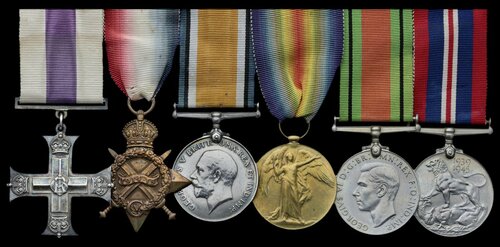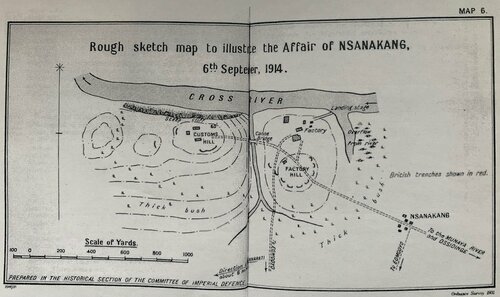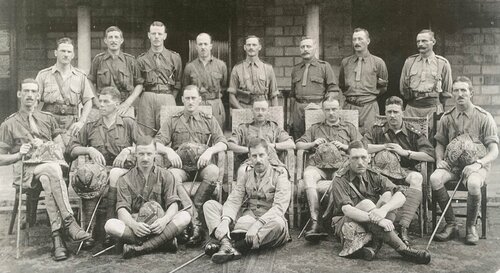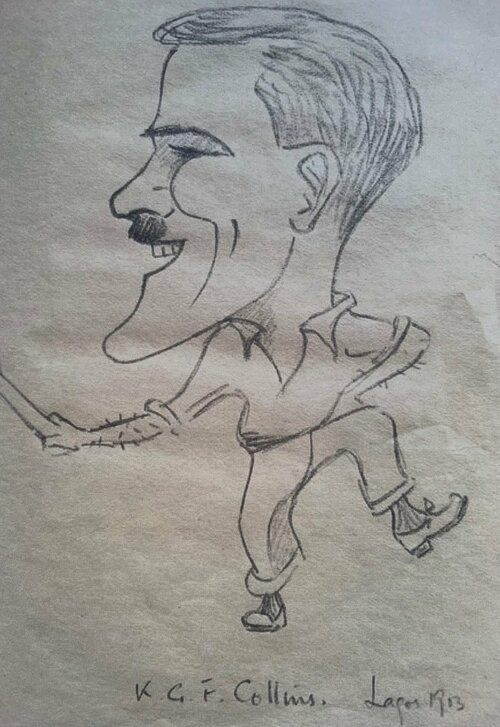Auction: 22001 - Orders, Decorations and Medals
Lot: 543
'The advancing troops of the Cross River Column holding Nsanakang were, on the 6th September [1914], suddenly attacked by a largely superior German force brought hurriedly from Duala, and, in spite of a most gallant resistance, were practically annihilated, only two Officers and some ninety native rank and file escaped by forcing their way through the enemy at the point of the bayonet. The German losses in personnel were even heavier than our own.'
The London Gazette, 31 May 1916, gives the official report on the action at Nsanakon.
A rare 'Battle of Nsanakong 6 September 1914' M.C. group of six awarded to Major K. G. F. Collins, Dorset Regiment, attached Nigeria Regiment, who served for many years with the West African Frontier Force
Having given a fine account of himself during the Battle itself, Collins and a comrade were posted missing and found themselves in the bush, alone and without food, not to mention with the Germans in hot pursuit; they survived for 5 days and eventually made it back to Allied lines
Military Cross, G.V.R., unnamed as issue; 1914-15 Star (Lieut. K. G. F. Collins. Dorset. R.); British War and Victory Medals (Capt. K. G. F. Collins.); Defence and War Medals 1939-45, mounted as worn, very fine (6)
M.C. London Gazette 30 January 1920.
Keith Gordon Flloyd Collins was born on 15 February 1886 and was commissioned into the Dorset Regiment on 22 May 1909, being advanced Lieutenant on 23 June 1910. He was employed with the West African Frontier Force for 1 January 1913 and served with the 3rd Battalion, Nigeria Regiment, upon the outbreak of the Great War. Collins served with his unit in the Cameroons from 10 August 1914. His Column from Ikom crossed the Cross River into the Cameroon and occupied the station of Nsanakong (also known as Nsanakang), 5km from the Nigerian border on 30 August. It had been Collins on 18 August who personally reconnoitred the village on 18 August who reported it would be possible to occupy it. The British numbered some 11 Europeans and a further 160 or so African soldiers and found themselves up against some 800 Germans under Hauptmann Rausch Emil. At 0200hrs on 6 September 1914 the enemy, armed with machine guns, attacked. The British defenders successfully repulsed this initial attack but in the process exhausted their ammunition. Another German attack came at five o'clock in the morning, this time from higher ground. The Official Report gives more on Collins:
'Lieutenant Collins on the extreme left finding he was exposed to a heavy reverse fire, crossed the creek to the east of the factory hoping to obtain another position on the other side but his movement was observed by the enemy who brought a maxim into action against him and his men.'
The British could not repulse the attack and the order came for an attempted to break-out - via a bayonet charge - the action was at close quarters and bloody to the extreme, considering the defenders were outnumbered at least 4 to 1. Eight of the eleven Europeans became casualties whilst some 95 Nigerians were killed, a further 16 being wounded, whilst the Germans took at least 150 casualties.
Those who made it through the charge found refuge in the thick forest but were without supplies and forced to go it alone to get over the frontier. The Germans harried and tracked any who fell behind in the withdrawal. Collins had gone it alone together with Lieutenant Rodwell and it was recorded that on 12 September:
'At 12 noon arrived at IKOM in a very exhausted state after living in the bush for 5 days without any food.'
Suitably recovered by 16 September, together with 18 rank and file, Collins departed Ikom. He remained with the West African Frontier Force until 18 August 1919 and had his Medals sent to him at The Rectory, Lydd, Kent in July 1921. Collins was made Adjutant of the 3rd Battalion, Dorset Regiment on 1 March 1922 and was advanced Major on 1 May 1926. He was made Acting Lieutenant-Colonel whilst with the Royal West African Frontier Force, attached Trans-Jordan Frontier Force from 18 June 1927-1 January 1928. Retired on 3 August 1935.
Subject to 20% VAT on Buyer’s Premium. For more information please view Terms and Conditions for Buyers.
Sold for
£4,000
Starting price
£1400











